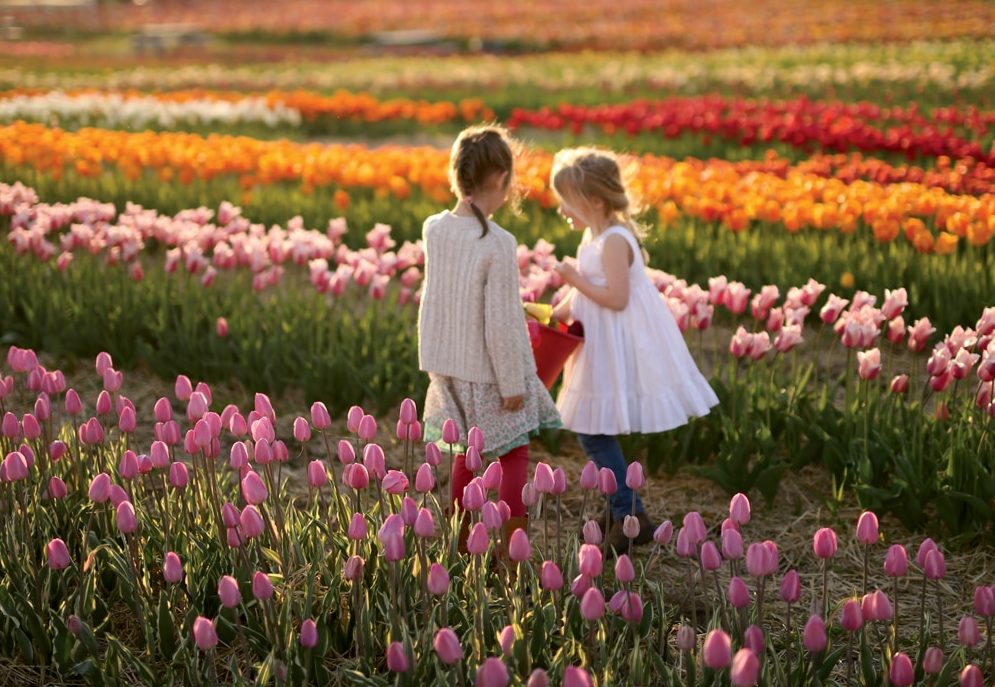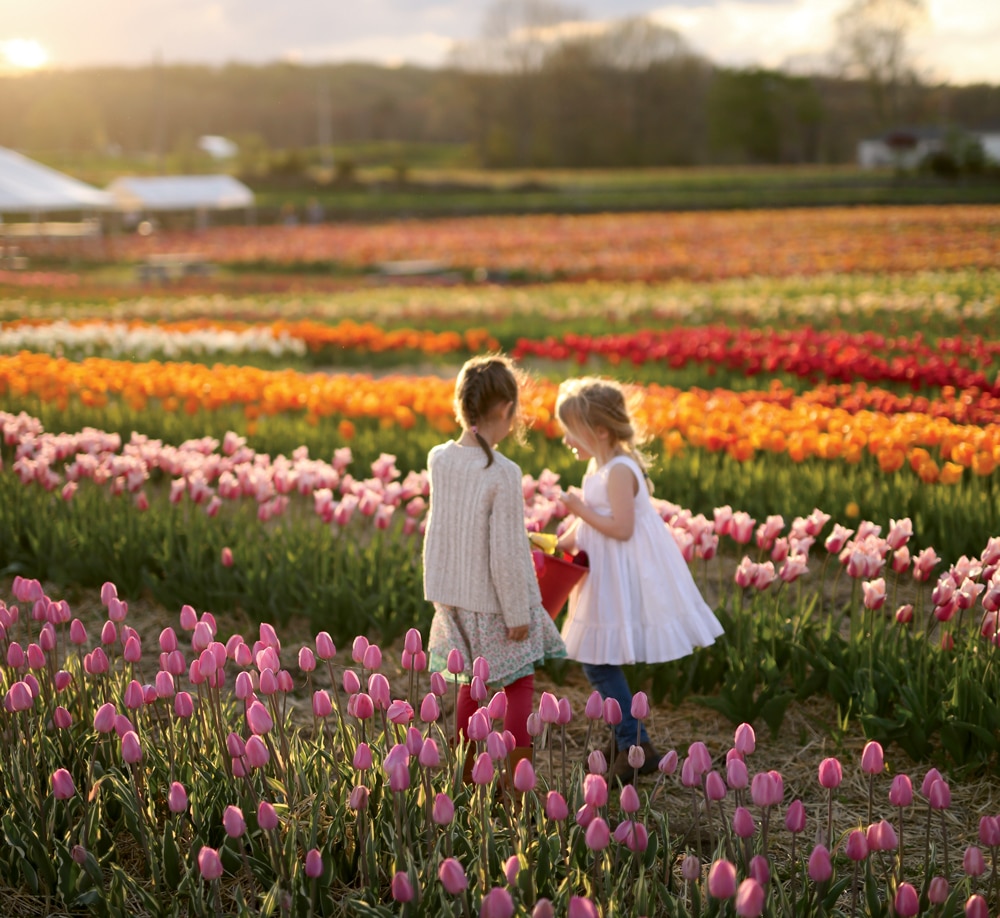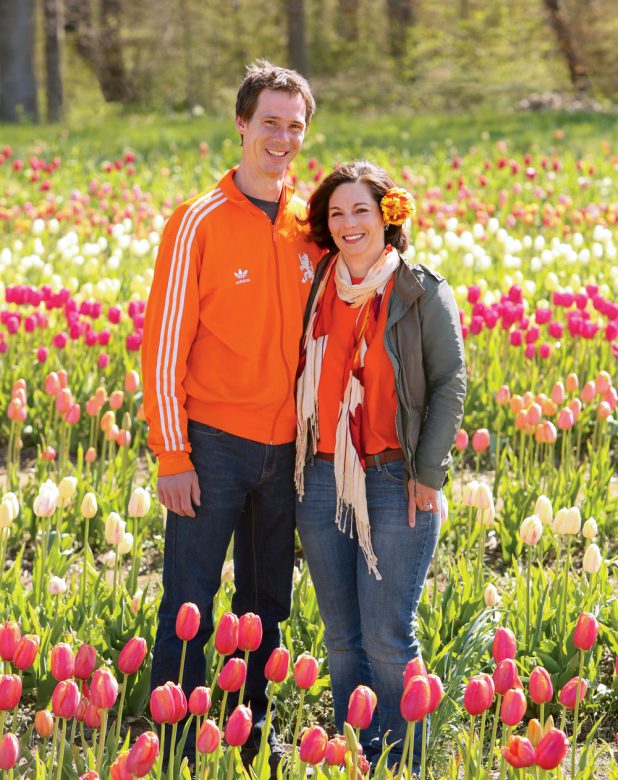Wicked Tulips in Johnston, Rhode Island | First Light
Rich colors and sweet scents herald spring— and draw a crowd—at this Rhode Island pick-your-own tulip farm.

As the light of sunset begins to spread across the fields at Wicked Tulips in Johnston, Rhode Island, a pair of bucket-toting youngsters pick their favorite blooms from the hundreds of thousands on offer at this one-of-a-kind organic farm.
Photo Credit : Maaike BernstromBy Steven Slosberg
On an early May morning under high blue skies, I am suddenly done in, seduced by an exultant impressionist’s landscape of almost every blooming color under the sun. I am not alone. Crowds of day pickers, arriving with the animated air of county-fair bustle, are only just beginning to make their way down the long dirt road to Wicked Tulips, New England’s only pick-your-own certified organic tulip farm, where 800,000 tulips are blossoming.

Photo Credit : Maaike Bernstrom
They have come here, to the grounds of historic Snake Den Farm in Johnston, Rhode Island, to disappear into color: pale pinks and blush pinks; purples cupped in yellow, purples dipped in ink; oranges richer than any citrus; reds bruised by violet; whites rinsed in apricot, lemon, and magenta. Petals like satin, petals like silk, all bunched in voluptuous rows of knee-high blossoms across five acres.
I take a breath of air scented by earth, flower, and straw-strewn pathways. Tulip lovers are here from seemingly every city, town, and village in Rhode Island; from the far reaches of Connecticut to the west, and well north into Massachusetts. They’ve arrived with children, with spouses, with parents and siblings. They are chatting, en masse, as garden clubs; they are in wheelchairs and in strollers; they are wearing broad-brimmed hats and ball caps; and they’re carrying buckets big and small. They’re here by the hundreds, patiently checking in at the entrance tent and looking about in wonder, as morning nears noon.
I chat with a seasoned gardener from Connecticut who happens to be Dutch. She has come to the farm with her daughter and 4-year-old granddaughter. “I picked exotics, French parrot tulips. They reminded me of a Dutch painting,” she says. “Everything here is a picture. In Holland, you cannot pick at Keukenhof [the world-renowned spring garden in Lisse]. Here, you can take some of this beauty home.”
An encounter with Jeroen Koeman, the tall and lean native of the Netherlands who owns Wicked Tulips with his Massachusetts-born wife, Keriann, embodies the frenzy of day picking and daily demands of a farm in its brief window of profitable harvest. With cap slightly askew and his “Wicked Tulips Farm” T-shirt ablaze with the national color of his homeland (orange), Jeroen has dismounted from his tractor to talk tulips with a dozen ladies from the Barrington Garden Club. Shortly into his talk, as he faces the group amid the picking fields, Jeroen is approached by Keriann, also in an orange T-shirt, who gently informs her husband that he’s left the tractor running.
Farming in New England, Jeroen tells the women in Dutch-accented English, is farming in New England weather. Wicked Tulips had hoped to open for the season in April, but a cold March left plants weakened, and this first week of May became the peak week for picking. Tulips are among spring’s most brilliant harbingers, and as neighboring farmers are still out preparing the soil and planting, and the oaks and maples rimming the farm are beginning to leaf out, Wicked Tulips and its customers are having their moment. For tulip lovers, there is no place like it, certainly not in these climes. Wicked Tulips, Jeroen tells his group of listeners, is the only source for certified organic tulip bulbs in the country.
Wicked Tulips evolved from the Koemans’ initial endeavor, EcoTulips, in Madison County, Virginia. Keriann was a mortgage broker and Jeroen was working for a large Dutch bulb wholesaler that had its U.S. base in Virginia. After several years running EcoTulips, however, the couple found the Virginia climate too hot too soon, and the local deer too ravenous, and began looking along the eastern seaboard for more favorable conditions. They briefly tried the North Fork on the eastern end of Long Island, and they eyed Maine. Then they heard about Snake Den Farm: Located just west of Providence, it’s part of the 1,000-acre Snake Den State Park and home to a handful of small farmers who lease land from the state.
“It’s best to be within 10 miles of the coast,” says Jeroen. “We thought Rhode Island might be the best climate for growing bulbs: cold in the winter, hot in the summer. Bulbs need dry and warm over the summer.”
In October 2015, they began planting the first of what would be 250,000 bulbs in “u-pick” fields, utilizing a Dutch-built planting machine—a Koningsplanter (“King’s Planter”)—shipped from the Netherlands. “In the past we planted up to 60,000 bulbs by hand,” Jeroen says. “[The machine] can plant all the bulbs in one day. By hand it would take almost two months.”

Photo Credit : Maaike Bernstrom
For the first pick-your-own season the following spring, they welcomed some 17,000 visitors to the tulip farm over three weeks, from late April to early May. The farm has also cultivated what it calls show gardens—meant only for ogling and strolling—as a respite for pickers and a sensory delight for all.
Buckets in hand, the pickers meander among the tulip rows, isolated from the world beyond the fields, carefully selecting blooms. From the picking fields, they head toward the wrapping station. Here, on long work tables outfitted with large rolls of brown paper, farm workers help them lay out the tulips and wrap them in paper bundles. Vases also are available for purchase.
For the record, Keriann says her favorite tulip is “Angelique,” a widely popular white-and-pink variety. Jeroen’s favorite, at first thought, is “Princess Irene,” an orange tulip showcasing the national color of the Netherlands and its royal House of Orange. Then he reconsiders and pronounces “Lalibela” his tulip of choice. “It is orange-red and super-strong. A classic tulip,” he says.
Although tulips are not perennials, Jeroen says, they do have perennial traits. “Whatever you plant will die, but the plant creates a few baby bulbs.” In summer, Jeroen digs up all the bulbs planted in the fall. “These bulbs double in quantity.” But, he adds, only about 10 to 20 percent of those bulbs are big enough to grow a flower in the spring.
The crowds of pickers are blissfully oblivious to the history and farming methods. Tulips are why they came, and tulips, carried by the bundle and armful as they make their way to their parked cars, are why they will return.
For up-to-date information on ticket prices and business hours, go to wickedtulips.com. This year would-be pickers also will be able to use the farm’s website to buy advance tickets, which are required for entry on weekends.


